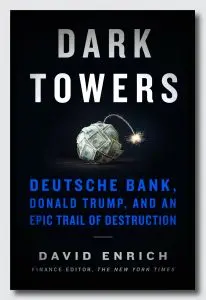In the wake of the 2014 suicide of Deutsche Bank executive Bill Broeksmit, who had been long regarded as the conscience of the scandal-plagued firm, his son, Val, accessed his father’s computer files to understand more. He shared some of those files—which touched on the bank’s relationship with clients Donald Trump and Jared Kushner—with reporters and federal investigators.
Val wasn’t the only source of frustration. The two committees in April issued subpoenas to Deutsche for its records related to the Trump and Kushner accounts—everything from personal financial information to any records related to suspicious activity reports tied to the accounts. In the hands of congressional Democrats, the materials could become a Rosetta Stone to unlock Trump’s innermost financial secrets. For that reason, when the president learned of the subpoenas, his lawyers sued to block Deutsche from complying. The dispute spent months winding through the federal court system. In the midst of that process, the intelligence committee in June issued a new subpoena—this one to Val. It demanded that he promptly hand over everything in his possession related to Deutsche. Val grudgingly complied.

In February 2019, the two agents—both with backgrounds in counterintelligence and currently on a squad focused on banking malfeasance—flew to California. Their meeting took place the same day that Michael Cohen, Trump’s former lawyer, testified on Capitol Hill that the president had routinely exaggerated his wealth in order to win loans from Deutsche Bank. Val, wearing a partly unbuttoned paisley shirt, arrived at the bureau’s field office in a federal building downtown. The agents met him in the tenth-floor lobby, where portraits of President Trump watched over visitors, and escorted him upstairs.
The meeting lasted three hours. Val munched on Kit Kats and raspberry-flavored fig bars and drank coffee and Coke and smoked his e-cigarette and unspooled his story a final time. The agents told him they had started out investigating Deutsche’s money laundering in Russia—the notorious mirror trades—but they had widened their scope to focus on an array of potential criminality at the bank. They were interested in DBTCA. They were interested in Monte dei Paschi. They were interested in the Fed’s stress tests. (Soon the same agents would be in touch with a number of Deutsche whistleblowers. One of the employees who had complained to the SEC about how the bank was hiding billions of dollars in losses on derivatives got a call. So did Tammy McFadden, the former compliance officer who had raised concerns about Kushner’s company moving money to Russians. These former employees were more than happy to help bring the bank to justice.)
If Deutsche executives had been listening in on Val’s interview, they would have been deeply unsettled. The bank’s confidence that the federal investigations into its crimes in Russia and elsewhere were wrapped up, neutered, had been misplaced. These two special agents, along with a team of their colleagues and federal prosecutors, were still on Deutsche’s trail—though it remained far from clear where this criminal investigation would go or whom it would touch. The agents didn’t think the crimes that occurred throughout the bank were the work of lone low-level employees—they suspected that this was the product of a culture of criminality that pervaded Deutsche. Tim Wiswell—Wiz, the supposed mastermind of the mirror trades—appeared to be a “fall guy,” a “scapegoat,” they explained. And now someone with a potentially valuable cache of documents was sitting in a large conference room in an FBI field office, being plied with sugary snacks—and the possibility of power.
“You’re holding documents that only people within the inner circle of Deutsche would ever see,” the first agent told Val.
“What we’ve been up against is stonewalling,” the other agent chimed in. “Clearly things went on in Deutsche Bank which weren’t kosher. What we’re up against is all those bad acts are being pushed down on the little people on the bottom.”
“The low-hanging fruit,” the first agent added.
“And the larger bank in its entirety is claiming ignorance and that it’s one bad player. But we know what we’ve seen, it’s a culture of just—”
“Fraud and dirt,” Val interjected, thrilled to be part of this. He called me from a Lyft afterward. His adrenaline was still pumping. “I am more emotionally invested in this than anyone in the world,” he said. “I would love to be their special informer.”
A couple of months later, a padded manila envelope arrived at [Val’s French girlfriend] Marie’s apartment, addressed to Val. The return address was the FBI’s Manhattan headquarters. Inside was a thumb drive. Val had concluded that the materials he’d guarded for the past five years belonged in the FBI’s hands—a decision made easier when the agents agreed to help Marie and her son secure visas so they could legally remain in the United States. The agents had told Val that once he had loaded his goods onto the miniature drive, someone would come by to pick it up. Val texted me a photo of the envelope. It had three postage stamps, each depicting a household pet: a mouse, a guinea pig, and a parrot.
“Guess I’m the mouse,” he wrote. I asked him why, and he responded within seconds, invoking a fable. “Because I can take down an elephant.”
From the book Dark Towers: Deutsche Bank, Donald Trump, and an Epic Trail of Destruction by David Enrich. Copyright © 2020 by David Enrich. From Custom House, a line of books from William Morrow/HarperCollins Publishers. Reprinted by permission.
Recognize your brand’s excellence by applying to this year’s Brands That Matter Awards before the early-rate deadline, May 3.
